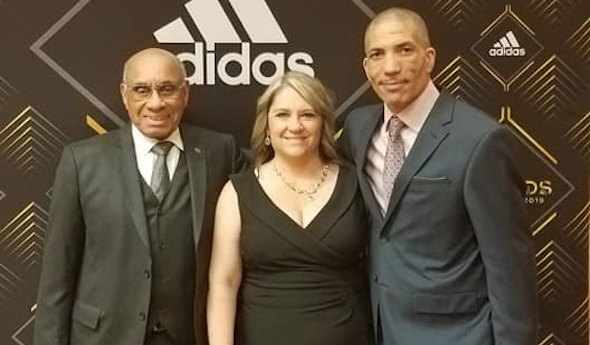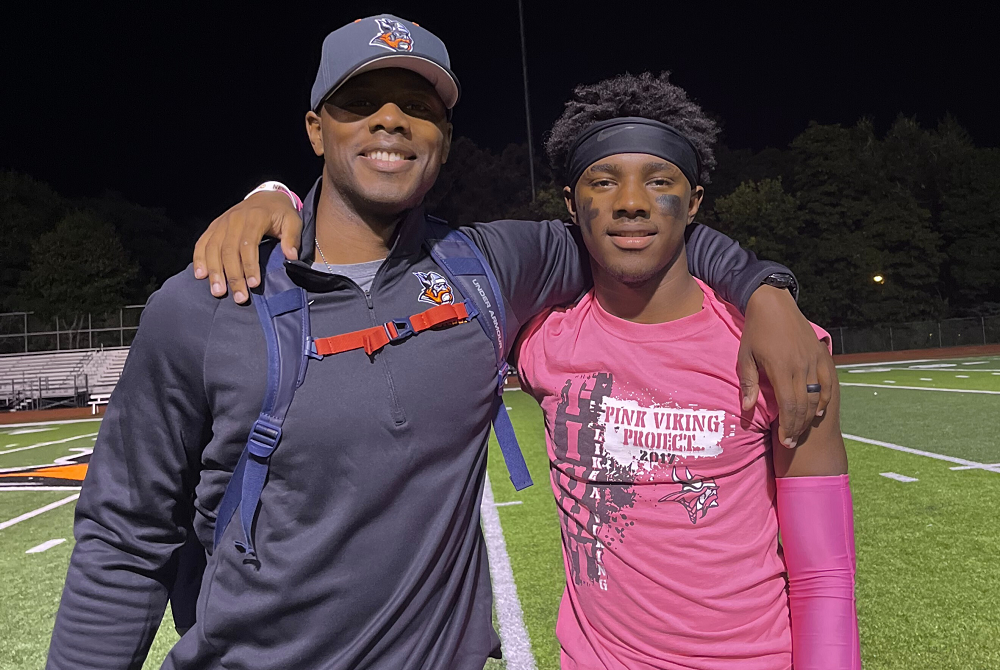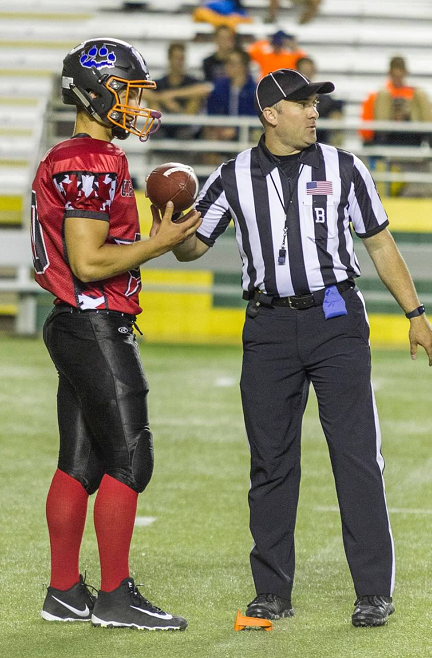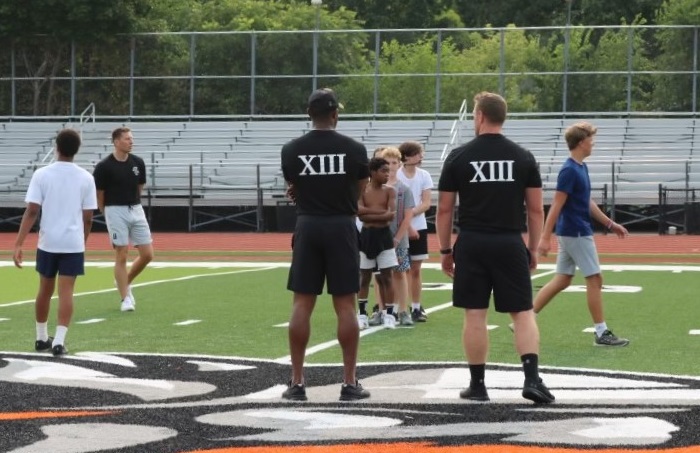
Flint's Phillips Named NHL 'Community Hero'
By
Paul Costanzo
Special for MHSAA.com
June 20, 2019
Rico Phillips had convinced himself before Wednesday night’s NHL Awards that he wasn’t going to win the Willie O’Ree Community Hero Award.
It was the easiest way to kill nerves that went along with having to speak in front of a room filled with NHL superstars and legends, as well as a national television audience.
But as the award was about to be announced, and a video montage started playing on the screen, the realization he could win started to come back to Phillips. Then O’Ree said his name.
“When I watched Willie O’Ree say my name, it was like this snapshot of time froze, and I was like, ‘No way,’” said Phillips, an MHSAA hockey official and the founder of the Flint Inner City Youth Hockey Program. “I embraced my wife. She has been the person that has been the best advisor to me, and to have her here with me was an incredible moment.”
Phillips was honored for founding and directing his organization, which has given a cost-free opportunity to play the game to about 150 kids ages 8-11 in Flint since 2010. He was one of three finalists, along with Tammi Lyncy of Washington, D.C., and Anthony Benavides of Detroit.
Fans submitted candidates for the award, and the field was whittled to the final three who were then voted on by the public.
The award is named after Hockey Hall of Famer O’Ree, who broke the NHL color barrier in 1958, and who has worked as the league’s diversity ambassador for more than 20 years. It is given to “an individual who – throughout the game of hockey – has positively impacted his or her community, culture or society,” according to a release from the NHL. This was the second year it has been awarded.
 “It was surreal, would be the first word,” Phillips said. “I felt an incredible honor – having just met Willie a couple months ago in person, he brings with him this magic. To look over and hear him say my name, it was like, ‘I can’t believe this is happening. Willie O’Ree – Willie O’Ree! – is giving me this award.”
“It was surreal, would be the first word,” Phillips said. “I felt an incredible honor – having just met Willie a couple months ago in person, he brings with him this magic. To look over and hear him say my name, it was like, ‘I can’t believe this is happening. Willie O’Ree – Willie O’Ree! – is giving me this award.”
Those who know Phillips could certainly believe it was happening, and that it was a well-deserved honor.
“I wasn’t surprised; I thought if anybody deserved that award, it was Rico,” said Steve Berriman, who serves as assigner and referee-in-chief for the Flint Ice Hockey Referees Association. “I was so darn proud; it was so well deserved. He’s immersed himself in the hockey culture. Whatever he’s accomplished has been all on Rico. He’s done it all himself. From where he’s started to where he’s come, and then the starting of this program, it’s 100 percent on him.”
Phillips, who is a firefighter in Flint, was introduced to the game during the 1980s and fell in love with it. He served as a student trainer for the hockey team at Flint Southwestern, and thanks to plenty of time spent with the officials while in that position, was convinced to get onto the ice wearing the stripes. He became an MHSAA registered official for ice hockey beginning with the 1990-91 season.
“I took up that challenge, and it was terrible at first, because I could barely skate,” Phillips said with a laugh. “One of the other challenges, besides learning how to skate, is that I was met with racial slurs and taunts. I was young, and it was tough. I thought, ‘What did I get myself into?’ I had some people who helped talk me through it.”
Phillips said those mentors explained to him that quitting would give those who taunted him what they wanted, and more than 30 years later, he’s still on the ice. He said he officiates about 40 high school games per year and has worked three MHSAA Semifinals and a handful of Quarterfinals.
It was during the late 1990s that the idea for the Flint Inner City Youth Hockey Program came to Phillips.
“As a hockey referee, in particular, it wasn’t just playing, I know the lack of cultural diversity (in hockey),” Phillips said. “It didn’t bother me, so to speak. But I thought, you know what, there’s something that can be done about this.”
About a decade later, he put the wheels in motion and went to the Flint-based Perani Hockey World to ask for financial assistance. Perani took things a step further, offering to outfit all of the players from head to toe, giving Phillips and his organization 54 sets of gear in total in the first year.
 After that first year, a funder fell through. But four years later, the United Way stepped in and provided funding to pay for ice time. The Flint Firebirds of the Ontario Hockey League have since stepped in to assist with ice time.
After that first year, a funder fell through. But four years later, the United Way stepped in and provided funding to pay for ice time. The Flint Firebirds of the Ontario Hockey League have since stepped in to assist with ice time.
“One of the things I appreciate about our program is that it’s a community collaborative effort,” Phillips said. “These folks give to us without a non-profit status.”
Since its inception, Phillips said that the program has served about 150 players. Each player not only receives gear and instruction at no cost, but also transportation to and from the arena.
“We have 12 that went on to continue playing hockey, which is huge,” Phillips said. “I’m very proud of that – I didn’t expect that. We help and seek out additional funding for our participants that come through to help with the cost as they move on. The kids that come to our program, they don’t understand or know about hockey or even ice skating. We’re taking these families and teaching them to love this sport.”
Phillips has been saddened by the decline of the sport in the Flint area, saying that when he began officiating there were more than 20 high school teams in the area, and now there are fewer than 10. He said he also struggles to fill his program each year.
He hopes that will change with the exposure that has come with this award.
“What I’m hoping is this opens up the doors a little more, that this brings some gravity,” Phillips said. “On the flip side, when talking about funding, (since he was announced as a finalist for the award) I’ve had owners of pro teams and others coming up to me saying, ‘We’re going to send you equipment and send you some funding.’ This definitely puts our program on the map – on the bigger map. It means a lot of more intense work that I have to do.”
The award also shined a positive light on Flint, which is something Phillips did not take for granted.
“It was an overwhelming response that I received from the community,” Phillips said. “There were watch parties – I just saw a video a little while ago of when the announcement was made, and they just went crazy. It means the world. I say this a lot of times, but there seems to be a dark cloud that likes to hang over Flint and has for decades. There are so many of us that are little lights that shine, and this was a big shining light. Every opportunity we get in Flint to pick our heads up and be proud is important.”
Click for more on the Willie O'Ree Community Hero Award.
PHOTOS: (Top) From right, Rico Phillips, wife Sandy and NHL Hall of Famer Willie O'Ree. (Middle) Phillips drops the puck for a face-off during the Division 3 Semifinal between Houghton and Riverview Gabriel Richard this winter. (Below) Phillips, left, with his award and the Nashville Predators' P.K. Subban. (Top and below photos courtesy of Rico Phillips.)

From MSP Post to Postgame: Lieutenants Return to the (Football) Field
September 27, 2023
While fans are settling into another season, Michigan State Police Lt. Tedric Gibbs has been fully immersed in football for months.
The Jackson Post’s assistant post commander serves as assistant coach for Jackson High School’s varsity football team and for the team at Parkside Middle School.
“I started coaching when my older son was in youth sports, as a way to do something together that we both love,” Gibbs said. “My younger son followed the same path, so I joined his team too. I grew up in Jackson and am grateful to be able to serve my hometown from the sidelines and at our post.”
 Some 400 miles north, Lt. Mark Giannunzio is also a familiar face in and on the field. The MSP Negaunee Post assistant post commander and Eighth District public information officer enforces the rules of the game as a high school and college football official, the latter for the Great Lakes Intercollegiate Athletic Conference.
Some 400 miles north, Lt. Mark Giannunzio is also a familiar face in and on the field. The MSP Negaunee Post assistant post commander and Eighth District public information officer enforces the rules of the game as a high school and college football official, the latter for the Great Lakes Intercollegiate Athletic Conference.
“I started at the high school level to stay involved in athletics and make authentic connections in the community,” Giannunzio said. “It’s rewarding to help teach the game and share knowledge of the rules. I currently have a full 11-game schedule in the GLIAC Division II college conference, with high school games interspersed during the year.”
The correlation among coaching, officiating and policing translates.
“With my fellow troopers, I want to inspire, motivate and encourage to get the most out of them,” Gibbs said. “I take the same approach with my players to figure out what they need from me, as their designated leader, to be as successful as they can. In both capacities, I do the work alongside them. We do it together.”
This approach is especially important when tough times surface. Lieutenant Gibbs’ high school team experienced tragedy right before its first game when a player died in a car crash.
“We focused on adversity,” said Gibbs, who was in a unique position to talk from a police perspective too. “It’s a benefit to have that insight and background and share it with what they can control – make good decisions and wear your seatbelt.”
Lieutenant Gibbs incorporates his coworkers when he can, like during spring conditioning when fellow troopers join him and his players, helping all involved to make new connections and build strong bonds between the students and officers.
 “One of the most important attributes in both careers is communication,” Giannunzio said. “Communication can make or break an official and a police officer. Much like selling a citation to a motorist, I need to be able to sell the penalty in a calm and professional manner. Demeanor and attitude go together on both the football field and when we are out patrolling in the Blue Goose.”
“One of the most important attributes in both careers is communication,” Giannunzio said. “Communication can make or break an official and a police officer. Much like selling a citation to a motorist, I need to be able to sell the penalty in a calm and professional manner. Demeanor and attitude go together on both the football field and when we are out patrolling in the Blue Goose.”
Treating everyone with dignity and respect is something Lieutenants Gibbs and Giannunzio commit to as members of a modern police agency and in their areas of expertise on the football field.
“Both roles afford so many opportunities to develop culture and cultivate teamwork,” Gibbs said. “The best part is watching others flourish and playing a part in their growth.”
PHOTOS (Top) Michigan State Police Lt. Tedric Gibbs, left, serves as an assistant football coach for the Jackson High varsity. (Middle) Lt. Mark Giannunzio officiates at the high school and college levels. (Below) Gibbs also coaches at Jackson Parkside Middle School. (Photos provided by the Michigan State Police.)

